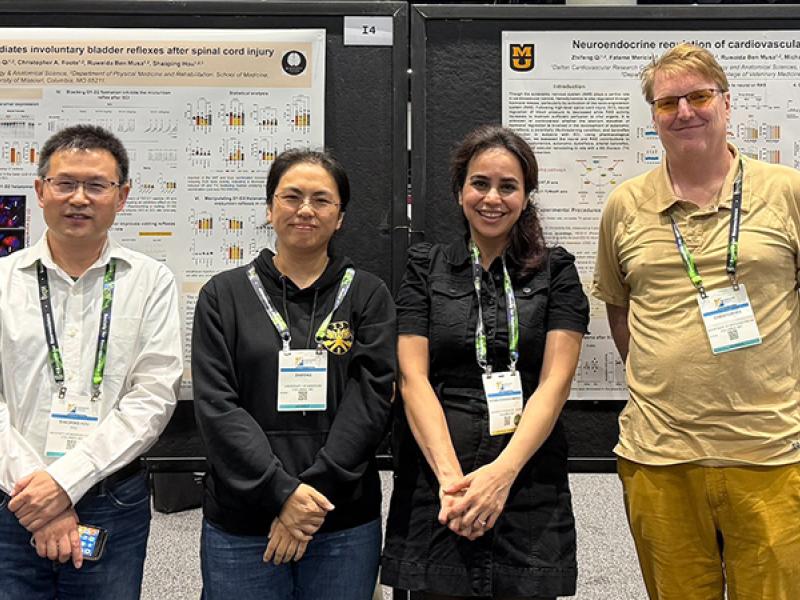The Rheumatology Division encourages research efforts in basic science and clinical investigations. Fellows may choose to participate in clinical trials with Chokkalingam Siva, MD, in clinical research via the ANA laboratory with our clinical faculty, or basic research in the immunology laboratory of Helen Mullen, PhD.
Complementing fellows’ individual interests, collaboration with the Physical Therapy/Occupational Therapy School and the Pain Clinic provide additional rich environments to develop investigatory projects and get hands-on clinical practice.
The immunology laboratory of Dr. Mullen provides fellows the opportunities to work in nationally funded research programs studying the molecular mechanisms of the pathogenesis of autoimmune thyroid disease in murine models. Dr. Mullen is a senior member of the division and has been continuously funded by the NIH for more than 30 years. As a leading immunologist, she currently studies cytokine regulation of autoimmune thyroiditis and thyroid epithelial cell hyperplasia.
Another project focuses on the role of B cells and regulatory T cells and their interaction to regulate the development of autoimmune disease. Her research is helping discern the mechanisms and factors that contribute to these thyroid lesions, which may suggest novel approaches for therapeutic interventions for controlling autoimmune inflammatory diseases. She has published over 100 peer-reviewed papers and is a leader in the field of autoimmune thyroid disease research. She provides a setting for those fellows inclined toward basic research.
Darcy Folzenlogen, MD, serves as the Medical Director of the Anti-Nuclear Antibody Laboratory (ANA), along with Celso Velázquez, MD, and Dr. Siva as associate medical directors. The ANA Laboratory was developed by Gordon Sharp, MD, the founder of University of Missouri rheumatology division and a pioneer in auto-immune and auto-antibody research. Through this lab, which has been in operation for more than three decades at MU, thousands of patients have provided serum samples from physicians throughout the country. That provides a pool of data that provides potential research inquiries for fellows and faculty. As scientific discoveries evolve, ANA tests are continually being updated. The current Complete ANA Profile can provide assistance in early detection, definitive diagnosis or exclusion of auto-immune systemic rheumatic diseases. Opportunities exist in our ANA Lab for fellows to participate in such research, answering vital questions regarding test results and their associations with clinical disease.
A recent study of anti-neutrophil cytoplasmic antibodies (ANCAs) testing guidelines by Delene Musielak, MD; Emily Larson, DO; Menka Desai, MD; Dr. Folzenlogen; and Dr. Siva was presented at the 2011 Regional American College of Physicians meeting and at the National American College of Physicians meeting in 2012.
The ANA lab is currently evaluating the newest testing methods and the expansion of available immunology tests. Currently, the lab provides testing for Fluorescent Antinuclear Antibodies (FANA), Anti-Nuclear Antibody (ANA) profiles (Anti SSA, SSB, PM-Scl, Centromere, Jo-1, Sm and RNP), Anti Double Stranded DNA (anti DS DNA), Anti-Phospholipid Antibodies (Anticardiolipin, Anti beta 2 glycoprotein 1), Anti-Neutrophilic Cytoplasmic Antibody testing (ANCA, Anti MPO, Anti PR3) and Anti Cyclic Citrullinated Antibodies (anti CCP).
- Dr. Folzenlogen has coauthored and presented scholarly works regarding urgent sleep issues associated with rheumatic diseases, post streptococcal syndromes, ANCA guideline testing, rheumatic fever, CNS vasculitis, spondyloarthropathies and approach to joint injection and aspiration. She has presented at regional symposia and departmental grand rounds.
- Dr. Siva, the division's fellowship program director, has coauthored papers, poster presentations and publications regarding anti-neutrophil cytoplasmic antibodies (ANCAs) testing, email medicine in rheumatology, PRES case series, male osteoporosis, rheumatologic testing, isolate large vessel vasculitis, rheumatoid arthritis self-management and anti CCP antibodies. He has also presented at departmental grand rounds.
- Dr. Velázquez, the division director and Rheumatology Clinic director, has coauthored and presented scholarly works regarding email medicine, PRES case series, male osteoporosis, fibromyalgia, calcium pyrophosphate disease manifestations, large vessel vasculitis, the approach to joint aspiration, rheumatic disease and pregnancy, rheumatoid arthritis and ankylosing spondylitis. He has lectured in his home country of Paraguay, presented at regional and local symposia, as well as departmental grand rounds.
- Deanna Davenport, FNP-BC MSN, has participated in regional symposia with presentations regarding fibromyalgia and rheumatoid arthritis. She also coauthored a recent paper on advances in fibromyalgia. Recent and current fellows (2010-12) participated in the regional American College of Physicians Joint Aspiration Workshop in September 2011, presented a poster at the 2011 National ACR and had a poster presented at the 2012 National ACP. They have been involved in over 14 scholarly works, including presentations, posters/abstracts and published and submitted articles.
- Dr. Siva has a long and keen interest in clinical trials. Current or recent investigations include:
- A multicenter, randomized, double-blind, long-term study of the safety of subcutaneous administration of tanezumab in patients with osteoarthritis of the knee or hip.
- Phase 3 randomized, double-blind, placebo-controlled study of the efficacy and safety of two doses of CP 690,550 in patients with active rheumatoid arthritis on background methotrexate.
- A long-term follow-up study of CP-690,550, a moderately selective Janus-kinase-3 inhibitor for the treatment of rheumatoid arthritis.
- A randomized, double-blind, placebo controlled, phase 2, study to assess the immune response following administration of influenza and pneumococcal vaccines to patients with rheumatoid arthritis receiving CP-690,550 or placebo CP-690,550 with and without background methotrexate.
- Dr. Velázquez has been involved in the development of the Rheumatology Objective Structured Clinical Examination (ROSCE) and Symposia. This has continued nearly annually and has been facilitated and supported by his colleagues from the University of Missouri, University of Kansas, University of Colorado, Washington University and Saint Louis University, as well as community rheumatologists. The Objective Structured Clinical Examination (OSCE) is a method of using clinical stations to assess competencies in the areas of rheumatologic practice and decision-making. The OSCE is a tool suggested by the Accreditation Council for Graduate Medical Education (ACGME). OSCEs are commonly used to assess medical students and residents but less often for fellows.
All faculty members mentor fellows to develop research projects with the intent of producing publishable manuscripts. Scholarly presentations at local, regional or national organizations are expected for all fellows and faculty.





